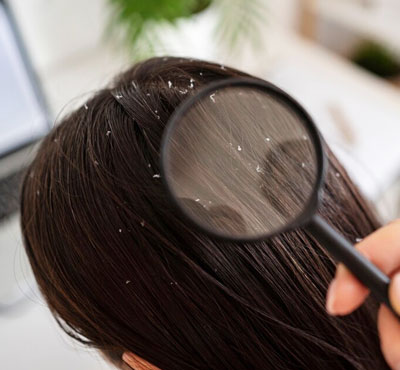What is Dandruff?
Dandruff is the condition of scaling of dead skin cells over the scalp. This physiological process happens in all but within those having dandruff, the process is accelerated, and visible flakes are a consequence. While dandruff is not contagious or harmful, it can be persistent and challenging to manage without the right approach.
Common Causes of Dandruff
Several factors contribute to the development of dandruff. Recognition of these factors can guide you to select the most appropriate treatments.
Malassezia Yeast Overgrowth
- Malassezia is a naturally occurring fungus on the scalp. In a few people it proliferates out of control, which produces irritation and increases the rate of exfoliation of skin cells, giving rise to dandruff.
Seborrheic Dermatitis
- It is a classic dermatological condition leading to erythema, greasy scales and scaling. It often occurs on the scalp and is one of the most common causes of dandruff.
Dry Scalp
- Itch can cause small white flakes that are frequently mistaken for dandruff. Unlike dandruff caused by excess oil, dry scalp dandruff is linked to a lack of moisture.
Sensitivity to Hair Products
- Some shampoos, conditioners, and styling agents are a source of irritants to the scalp, leading to contact dermatitis and also to desquamation-like symptoms.
Hormonal Changes
- Hormonal fluctuations, such as those during puberty or pregnancy, can alter the scalp's oil production, potentially leading to dandruff.
Poor Hygiene
- Infrequent shampooing can lead to an accumulation of oil and dead skin cells on the scalp, creating an environment conducive to dandruff.
Symptoms of Dandruff
Dandruff manifests in a variety of ways, including:-
- White to yellowish flakes on the scalp, hair, back of the neck and on clothing.
- Itchy scalp
- Oily or greasy patches on the scalp
- Redness and irritation
The chronicity of symptoms can vary from mild and infrequent to chronic and disabling, necessitating medical attention.
Effective Treatments for Dandruff
Dandruff can be successfully treated by appropriate therapy and lifestyle modifications [6]. Below are some strategies to help control dandruff:-
Medicated Shampoos
Shampoos with active components (OTC and prescription) can help to manage dandruff symptoms. Common ingredients include:-
- Zinc Pyrithione - Reduces fungus and bacteria on the scalp.
- Ketoconazole - An antifungal agent that targets Malassezia yeast.
- Selenium Sulfide - Slows skin cell turnover and reduces oil production.
- Coal Tar - Reduces the shedding and death rates of scalp skin cells.
- Salicylic Acid - Helps remove flakes by exfoliating the scalp.
Natural Remedies
Some people prefer natural approaches to manage dandruff. Popular remedies include:-
- Tea Tree Oil - Known for its antifungal and antibacterial properties.
- Apple Cider Vinegar - Balances the scalp's pH and reduces yeast growth.
- Coconut Oil - Moisturizes the scalp and reduces irritation.
Improved Scalp Hygiene
Regular washings of hair help to shed unwanted sebum and detachment of skin scales. Choose gentle, sulfate-free shampoos that suit your scalp type.
- Dietary Adjustments The use of an antioxidant-enriched diet that is high in zinc, B vitamins and omega-3 acids can help maintain a healthy scalp. Avoiding excessive sugar and processed foods may also help.
- Stress Management Stress can exacerbate dandruff symptoms. Stress-relieving exercises such as yoga, meditation, or physical exercise, can be helpful.


